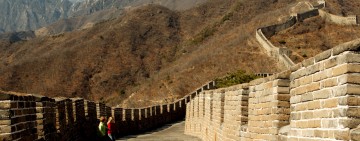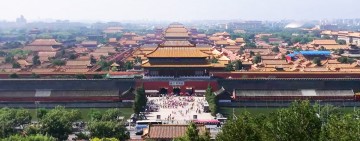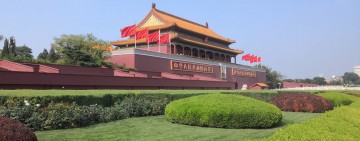Traveling in China as a Wheelchair User
Last updated on 2020-05-07Thanks to the 2008 Beijing Paralympic Games, some attractions and facilities in Beijing have been renovated to be accessible to some degree for wheelchair users. More importantly, since 2008, accessibility has been receiving more attention in the renovation and construction of tourist sites, infrastructure, transportation, hotels, etc. in big Chinese cities. Even so, unfortunately, China is still far from wheelchair friendly, even in big cities like Beijing and Shanghai.
However, those who need a wheelchair to get around should not be put off from visiting China. Instead, with careful planning before the trip, and some patience and a certain level of help from others while traveling, wheelchair users will be able to visit many famous attractions that China has to offer, even on their own. Below is a guide about accessibility in China to help wheelchair users and their loved ones when planning a trip to China.

Sightseeing for Wheelchair Users
The Great Wall is definitely a must-see for any visitor to China. However, the Great Wall was deliberately built on steep, mountainous terrain to resist enemy attacks in ancient times. Today, as a result, visitors need to climb a lot of steps to access and explore the Great Wall, which presents a huge challenge for those with mobility issues. That said, there are a few sections of the Great Wall near Beijing where wheelchair users can get an intimate experience of this architectural wonder.
In preparation for the 2008 Paralympic Games, Badaling Great Wall was renovated with ramps and elevators to facilitate wheelchair users’ access to the wall. With these facilities, wheelchair users can get onto the Wall and travel a short distance along it. Mutianyu Great Wall provides a cableway that can take visitors directly to the base of the Wall, where they can appreciate it from a higher position. However, travelers who completely rely on wheelchairs can not move far from the cableway station before encountering steps. Juyongguan Great Wall is also a good choice for wheelchair users because visitors can be driven to the parking lot right beneath Juyong Pass and the Wall, and they can appreciate nice views of the Wall from below. However, wheelchair users cannot get onto the Wall itself here, since there are many steps leading up to it.
Other major attractions in big cities, such as Tiananmen Square and the Forbidden City in Beijing and the Terracotta Army in Xi'an, are usually wheelchair accessible to some degree. That means wheelchair users may not be able to tour every part of these sites, but they will have access to the most important sections of these attractions.
Accessibility of Public Transportation in China
Subways can be found in many Chinese cities. Because most subway lines were built in recent years, this is by far the most wheelchair friendly form of public transportation in China. With new lines, there are usually elevators that can transport you directly to/from the subway platform. Be sure to ask the staff or pay attention to signs (most of which are in English) to determine which exits are equipped with elevators, since not all exits have them. Some older lines, like lines 1 and 2 in Beijing, may not have a vertical elevator at most stations, but stair crawlers are available upon request. Be sure to ask the station staff whenever you are not sure or need help.

All subway trains have adequate space for wheelchairs. Take care when boarding the train, however, as not all trains are level with the platform; entering the train should be manageable with the help of the staff.
Using public buses may be difficult for wheelchair users. In big cities, some buses may have a special seating area for wheelchair users, but few buses are equipped with an automatic lift and many have high steps or narrow doors. It is better for wheelchair users to avoid the public bus when traveling in China.
While wheelchair accessible taxis were made available in Beijing in preparation for the 2008 Beijing Paralympic Games, these vehicles are rarely seen on the road and are often unavailable. You can take normal taxis, but you may need assistance getting in/out of the car.
In China, most cities are connected by bullet train, making this a convenient way to travel between cities. The stations for the high-speed railway are all newly constructed with accessibility needs considered. The bullet train is usually level with the platform, and there is ample space for wheelchairs inside the trains themselves. Some newer bullet trains are also equipped with wheelchair accessible restrooms. Normal trains and older railway stations are also accessible to some degree, but you may need assistance from the station staff. Disabled people have priority when boarding trains in China. Be sure to ask the staff if you are not sure where to wait.
When taking a domestic flight in China, wheelchair users need to apply for a wheelchair cabin seat (WCHC) at least 72 hours before departure. When applying, you need to provide proof that you must use a wheelchair when taking a plane for health or mobility reasons. Your personal wheelchair will need to be checked in as luggage for free. Staff will use an airport wheelchair to transfer you to your seat in the cabin and, when getting off, to transport you to the luggage claim area and help you return to your own wheelchair.
If your wheelchair uses lithium-ion batteries, you will need to take the batteries with you as carry-on luggage. Each battery must be no more than 300Wh, and you are limited to two batteries maximum.
Please be aware that different airline companies or airports may have different rules or conditions, so be sure to call your airline and airports about the procedures and restrictions for wheelchair users.
Accessible Public Restrooms in China
Restrooms in airports throughout China are usually wheelchair accessible. At major attractions in big cities, such as the Forbidden City in Beijing and the Terracotta Army in Xi'an, public restrooms are mostly accessible. Some public toilets along the streets in big cities are also wheelchair friendly, but not all of them. There is usually a sign outside if a public toilet is wheelchair accessible.

Accessible Hotels & Restaurants in China
In China, 4- or 5-star hotels may have rooms that are accessible to wheelchair users, but they may not meet the standards of Western countries. Be sure to check with the hotel staff concerning their handicap accessible rooms before booking.
Restaurants are usually easy to access for wheelchair users, although you may sometimes need others’ help if there are steps at the entrance. Restrooms in restaurants, however, are usually not wheelchair accessible.
The China Guide Can Help
Planning a trip takes a lot of research and preparation, and this is especially true for wheelchair users. Adding to these challenges, China’s fast-changing infrastructure and other factors make it difficult to find or rely on information on the internet. To make it easier, wheelchair users can let a travel agency, like The China Guide, do all the necessary research and planning for you. We will get up-to-date information from our guides and other service providers, and craft an itinerary that is suitable for your mobility level.
At The China Guide, we use cars or vans that can fit a wheelchair (without automatic lift, but your guide and driver will help you to get in and out of the vehicle). We can also provide a wheelchair for you to use while you are in China. During your trip, your guide will help you move around, find accessible restrooms, and provide any other assistance required to ensure a hassle-free experience during your tour in China.
—
The China Guide is a Beijing-based travel agency that customizes private tours, educational student tours, and incentive trips across China. We have more than ten years of experience crafting tours for tens of thousands of travelers from the United States, Canada, Australia, the United Kingdom, Germany, France, Spain, and beyond. We promise all our tours have no hidden fees, no shopping stops, no touristy restaurants, just memorable experiences! Learn more about us or contact us to start planning your perfect China trip.




